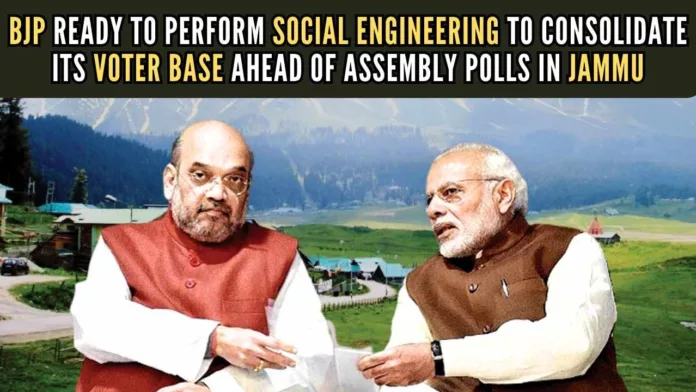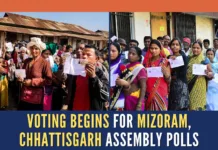
Union govt introduces three bills
In a move with far-reaching implications, the Union government on Wednesday introduced three bills namely, The Constitution (Jammu & Kashmir) Scheduled Tribes Order (Amendment) Bill, 2023, The Constitution (Jammu and Kashmir) Scheduled Castes Order (Amendment) Bill, 2023 and The Jammu and Kashmir Reservation (Amendment) Bill, 2023 in the Lok Sabha.
A fruitful meeting at the residence of Union Home Minister Amit Shah on Tuesday with the representatives of the Gujjar/ Bakerwal and Pahadi communities from Jammu and Kashmir paved the way for the introduction of these bills.
The Union Home Minister had earlier last year promised reservation to Paharis and assured Gujjar Bakerwals that not even 1% of their quota will be reduced.
The objective behind introducing the bills
The Constitution (Jammu and Kashmir) Scheduled Tribes Order (Amendment) Bill, 2023 was introduced with the sole objective of politically empowering members of the Pahari community and a few other tribes/ communities in J&K’s Scheduled Tribes list.
The second bill, The Constitution (Jammu and Kashmir) Scheduled Castes Order (Amendment) Bill, 2023, seeks the inclusion of the Valmiki community in the list of Scheduled Castes of Jammu and Kashmir. Valmikis, who were considered non-natives in J&K before the August 5, 2019, constitutional changes, were brought to J&K in 1957 by the state government in the wake of a strike by safai karamcharis in Jammu.
The third bill being brought in parliament seeks to rechristen “Weak and Under-privileged Classes (Social Castes)” as “Other Backward Classes”. After parliament approves this Bill, the UT administration will expand the OBC list by adding 15 more communities/ classes.
Through this move, the Bharatiya Janta Party is aiming to further consolidate its voter base across the Pir Panchal region.
By wooing members of the Pahari community BJP is also aiming to exploit the existing fault lines between the Gujjar/ Bakerwal and Pahari-speaking population.
Pahari constitutes Muslims, Hindus, and Sikhs living in hilly areas of Jammu and Kashmir. Declaring Paharis as a Schedule Tribe would make them eligible to contest polls on the seats reserved for already notified STs by the delimitation commission. Paharis are in a majority in seven out of eight segments of the Pir Panchal region.
After the passage of the bills Gaddis, Sippis and Sheenas; Pahari Kabila, Paddari tribe, Gadda Brahman tribe, and Koli tribal community will be entitled to 10 percent political reservation under ST category right from Panchayat to Assembly and Parliament.
In the Jammu and Kashmir Assembly, nine seats i.e. 10 percent have been reserved for STs.
Despite clear-cut assurances, apprehensions were raised in the mind of members of the Gujjar/ Bakerwal community that Paharis and others will be given reservations from their allotted 10 percent quota.
To address their genuine concerns and to create harmony between the communities the Union Home Minister met their representatives on the eve of the introduction of these bills in New Delhi.
The two delegations met the Union Home Minister separately along with Lieutenant Governor Manoj Sinha. In both meetings, categoric assurances were given by the Union Home Minister to soothe their nerves.
A senior Pahari leader from the Jammu region, who attended the meeting with the Home Minister on the telephone said, “Ten percent reservation granted to Gujjars and Bakerwals in Government jobs and educational institutions in Jammu and Kashmir will not be disturbed while Pahari tribe and others will get a separate reservation and both will be treated as Scheduled Tribe (ST).
All those who are already entitled to reservation under the ST category, including Gujjars/ Bakerwals, Gaddis, Sippis, and Sheenas will continue to get 10 percent reservation in educational institutions, jobs, etc in Jammu and Kashmir while the Pahari tribe, Paddari tribe, Gadda tribal Brahmans and Koli tribal community will get a separate reservation.
“At the national level also, all groups will fall under the ST category,” they said, adding new castes will be inserted in the list of STs for the purpose of reservation in terms of jobs, educational institutions, and politics.
While making efforts to woo the Pahari community the BJP cannot afford to antagonize Gujjar-Bakerwals in the region, who were notified as a ST in 1991 and have a substantial population in J&K. It is for this reason BJP leadership has taken due care not to tinker with the existing reservation quota of the Gujjar/ Bakerwals.
Besides members of the Pahari community, Paddaris, Gadda Braman and Koli tribes will be included in the ST list.
The grant of the ST reservation to Paddaris will benefit the BJP in the erstwhile Doda district due to its sizable population.
Interestingly, a majority of the social groups being recognized as OBCs are from the Jammu region. The new classes being added to the list include Waghey (Chopan), Ghirath/ Bhati/ Chang community, Jat community, Saini community, Markabans/ PonyWalas, Sochi community, Christian Biradari (converted from Hindu Valmiki), Sunar/ Swarankar Teeli (Hindu Teeli along with already existing Muslim Teli), Perna/ Kouro (Kaurav), Bojru/ Decount/ Dubdabay Brahmin, Gorkans, Gorkhas, West Pakistani refugees (excluding SCs) and Acharyas.
These new classes/ communities were included in the OBC list on recommendations of the G D Sharma panel.
Note:
1. Text in Blue points to additional data on the topic.
2. The views expressed here are those of the author and do not necessarily represent or reflect the views of PGurus.
PGurus is now on Telegram. Click here to join our channel and stay updated with all the latest news and views
For all the latest updates, download PGurus App.
- Assembly polls in Jammu and Kashmir soon: Modi - April 12, 2024
- Campaign trail: Udhampur-Doda Lok Sabha seat - April 8, 2024
- Ghulam Nabi Azad returns to the poll arena, to contest the Anantnag-Rajouri Lok Sabha seat - April 2, 2024










